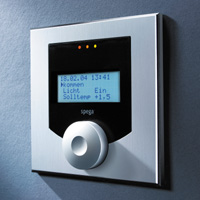Home automation
(Redirected from Smart home)
Home automation refers to the use of computer and information technology to control home appliances and features (such as windows or lighting). Systems can range from simple remote control of lighting through to complex computer/micro-controller based networks with varying degrees of intelligence and automation. Home automation is a step towards what is referred to as the "Internet of Things", in which everything has an assigned IP address, and can be monitored and accessed remotely.
The main components of a home automation system are a central hub or gateway, sensors, and actuators. The central hub, also known as a "smart home hub," is a hardware device that connects devices on a home automation network and controls communications among them. Sensors can monitor changes in daylight, temperature, or motion detection. Actuators are the mechanisms that control the mechanism or system, such as switches or motors.
Benefits of Home Automation[edit | edit source]
Home automation systems can provide increased convenience, improved energy efficiency, enhanced security, and comfort, as well as remote control of home devices. For example, a homeowner can program their system to adjust the temperature based on the time of day or control the lighting when they are on vacation to simulate occupancy.
Technologies[edit | edit source]
Several technologies are used in home automation, including:
- Zigbee and Z-Wave, which are wireless protocols designed for low-bandwidth data transmission in an automated home network.
- Wi-Fi and Bluetooth, which are also used for communication between devices.
- Infrared (IR), which is a simple and common method, especially for the control of household electronics like televisions.
Challenges[edit | edit source]
Despite its benefits, home automation faces challenges such as privacy and security concerns, interoperability issues between devices from different manufacturers, and the initial cost of setting up a system.
Future of Home Automation[edit | edit source]
The future of home automation could see more intelligent systems capable of learning a homeowner's habits and preferences to automate tasks without explicit commands. Integration with artificial intelligence and machine learning technologies could lead to more predictive and adaptive systems.
Search WikiMD
Ad.Tired of being Overweight? Try W8MD's physician weight loss program.
Semaglutide (Ozempic / Wegovy and Tirzepatide (Mounjaro / Zepbound) available.
Advertise on WikiMD
|
WikiMD's Wellness Encyclopedia |
| Let Food Be Thy Medicine Medicine Thy Food - Hippocrates |
Translate this page: - East Asian
中文,
日本,
한국어,
South Asian
हिन्दी,
தமிழ்,
తెలుగు,
Urdu,
ಕನ್ನಡ,
Southeast Asian
Indonesian,
Vietnamese,
Thai,
မြန်မာဘာသာ,
বাংলা
European
español,
Deutsch,
français,
Greek,
português do Brasil,
polski,
română,
русский,
Nederlands,
norsk,
svenska,
suomi,
Italian
Middle Eastern & African
عربى,
Turkish,
Persian,
Hebrew,
Afrikaans,
isiZulu,
Kiswahili,
Other
Bulgarian,
Hungarian,
Czech,
Swedish,
മലയാളം,
मराठी,
ਪੰਜਾਬੀ,
ગુજરાતી,
Portuguese,
Ukrainian
Medical Disclaimer: WikiMD is not a substitute for professional medical advice. The information on WikiMD is provided as an information resource only, may be incorrect, outdated or misleading, and is not to be used or relied on for any diagnostic or treatment purposes. Please consult your health care provider before making any healthcare decisions or for guidance about a specific medical condition. WikiMD expressly disclaims responsibility, and shall have no liability, for any damages, loss, injury, or liability whatsoever suffered as a result of your reliance on the information contained in this site. By visiting this site you agree to the foregoing terms and conditions, which may from time to time be changed or supplemented by WikiMD. If you do not agree to the foregoing terms and conditions, you should not enter or use this site. See full disclaimer.
Credits:Most images are courtesy of Wikimedia commons, and templates, categories Wikipedia, licensed under CC BY SA or similar.
Contributors: Prab R. Tumpati, MD




